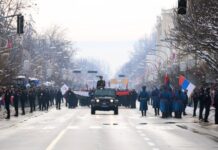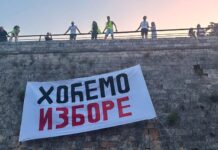When we speak of political literacy, its importance, and place it within the context of Serbia – especially Serbia as it is today – we’re presented with an exceptionally solid foundation upon which a modern state yet needs to be built. Personally, I believe that young people, across the world, should be familiar with both the political and legal systems. However, such a view has been upheld for generations. It is no coincidence that the term idiot (idiotes) in ancient Greece referred to a person indifferent to public affairs, nor that the study of law was mandatory in the Roman Empire from the earliest stages of education. The old Latin phrase ignorantia iuris nocet (not knowing the law is harmful) should be taken very seriously.
The situation in Serbia, however, is quite specific. The democratic changes that followed October 5, 2000, deeply shook the then-prevailing attitudes, especially considering how much more complicated (and genuinely difficult) it was to access information at the time. This view is supported by a global trend, which fortunately includes Serbia and shows that the country today has a significantly higher percentage of well-educated and better-informed citizens. For instance, data from the year 2000 reveals that as many as 67% of people believed democracy to be “superfluous.” Today, to be fair, we’re witnessing a kind of maturation – although it’s still very much a young democracy… at least on paper.
The importance of political literacy, while universal and necessary everywhere, reflects some of the most crucial aspects of modern society in Serbia today. As such, it holds the potential to serve as a blueprint for development – not just for Serbia, but for the entire region. Recent events have been, at the very least, unexpected and surprising, especially when one considers how politics is portrayed in this country through the media, public discourse, and, perhaps most notably, education. Namely, aside from history (the proverbial teacher of life), a bit of geography, and perhaps a few Serbian language lessons, two school subjects stand out as completely marginalized. The first is Civic Education- essentially an optional course (an alternative to religious studies) present throughout primary and secondary school. The second is Constitution and Citizens’ Rights, which is mandatory, though only in the social sciences field. The status of these subjects is, to say the least, unacceptable if we want to see the political awareness of young people develop.
Honestly speaking, if you were to ask me what is taught in Civic Education, I’d say I have no idea. In most cases (at least in mine), the subject wasn’t even held during primary school, and in high school, it was more of a “coffee break.” Truly tragic. The situation with “The Constitution” was slightly different… It was a required subject (again, only for certain academic tracks), but in my high school it held about as much weight as Civic Education—in other words, none. I think if our entire class managed to say “The Constitution is the highest legal act of a state,” the course would have been considered a success. Because, really, it was complete marginalization, as if the state itself deliberately wanted to keep us politically illiterate. After all, who needs individuals who actually understand the system they live in?
In that kind of darkness, the recent developments are all the more shocking. The average citizen – and even seasoned political scientists- are asking: how is it possible that such an “uneducated” generation is causing tectonic shifts, not only in Serbia but shaking the foundations of the entire European continent? I believe there are multiple answers to this. Alongside widespread societal apathy and aversion to politics, where engaging in politics is at the very least stigmatized, a new generation has emerged that, as it turns out, is remarkably aware. Perhaps this can be attributed to their lack of exposure to the previous communist and, later, practically dictatorial regimes, and the fact that these generations across the Balkans, in general, may not be accustomed to traditional “leaders” and idol-worship. Perhaps globalization also plays a role, as does the reality that local youth closely follow global events and gather information from international, widely accepted media and social networks.
Some studies show that only one in five young people in Serbia still watches traditional television… So perhaps it’s not surprising to see a sign at one local protest with a drawing of a TV next to the words: “Don’t lie to my grandma.” As for the fate of the even more outdated printed media- there’s hardly any point in discussing it. Still, none of these facts can definitively explain what pushed the youth in Serbia toward such significant political organization – on a level that would put even the most celebrated mass-mobilization efforts to shame.
Guidelines, frameworks, and indicators of political awareness in Serbia are, to an extent, indeed necessary – but I would say, less so than in many other societies. In the past six months alone, there have been more than enough indicators. Starting with the so-called “plenum-style organizing,” open to absolutely every student in Serbia, where anyone can voice their opinion, but also be recalled by majority vote for, say, inappropriate behavior or rule violations, this is, in the truest sense, what we mean by “direct democracy.” Every protest, march, or boycott has been carefully and thoughtfully organized, I would say, more out of the sheer will of participants than any formal political education which, as mentioned, is lacking.
Still, I’d like to point out one additional issue, deeply rooted in the context of these events – the older generations. I’m not referring to pensioners swayed by propaganda, but to those who in principle support the protests, yet somehow expect students to solve all the problems. It doesn’t work like that. The youth of Serbia have set the direction, but meaningful change must come from the current “leading” generations. After all, according to the Constitution and numerous laws, young people below a certain age (often 35+) are barred from holding the most important state functions. Young people know this – or they’ve come to know it – because the situation has become so all-encompassing that even those who once considered themselves apolitical are now engaged. To speak with full honesty – I can say that political engagement has become a “trend.” That’s certainly not ideal, but it has mobilized Serbian youth more than any other event I can remember.
In conclusion, I want to emphasize the importance of perseverance. Protests and movements in various Serbian cities have been ongoing for months. They may seem to be fading, but they continue. Courage still resides in university hallways, where students spend their own money to buy equipment and develop “occupied” cultural spaces, all while enduring, daily beatings, insults, and threats. The students of Serbia, I can say with pride, have truly shown – both to themselves and to everyone else – that the youth of this country are not apolitical, not indifferent, and most importantly – they do not give up.
Until the demands are met!
Darko Mandić













